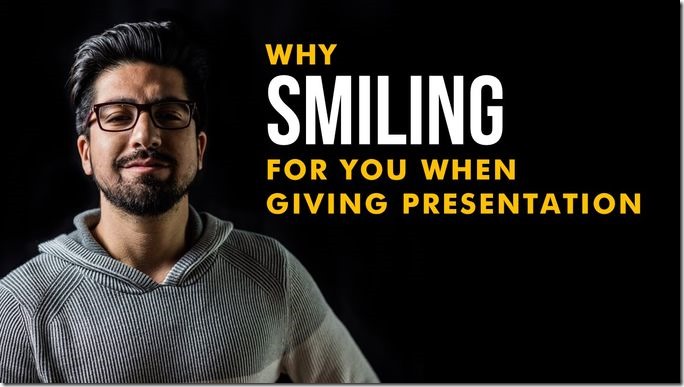
Some of you might say, “Standing in front of audience without getting cold feet sometimes is already hard, let alone smiling.”
Well, the truth is smiling can help you reduce stress and shake off all your fears while talking in front of people, such as in a presentation.
A smile has its own strength. To your audience, a smile expresses warmth. For yourself, it gives a strong impression on how you see the world.
When you smile, you change the effect of the reaction on your body. The body releases dopamine, serotonin, and endorphins, the hormones that responsible for calmness and pleasure. Aren’t these conditions you really need to overcome your fears and stage fright?
When giving a presentation, your smile is an important part of the instruments that exist in your body. Smiles can modulate your voice, thus enabling you to get more engaged to your audience.
Our body is a tool, just like a musical instrument. The design is important. Our mouth is the bell of the instrument, while smile determines its shape. When you change the shape of the bell, it also changes your voice.
When you smile, you can feel it changes the atmosphere, from your stage to the entire room.
There are so many reasons why you better smile when giving presentation. The release of the happy hormones was just one of the them.
-
It makes you look cool and credible

People say, the less emotion you how, the more you look cool and credible. Apparently, not really. The Journal of Consumer Research in 2018 reveals the opposite. Looking serious or credible has nothing to do with smiling.
Researchers found that public speakers who smile look cooler than less expressive ones. In addition, unable to smile risks the absence of connection with the audience. And we all know that connectedness is needed in effective communication.
-
It helps you to build connection with audience

This point is related to the previous reason. Giving a presentation is a form of communication that based on relationships. Presenters need to smile to help them develop connections with the audience.
People tend to mimic face expression their interlocutors. The mimicry often occur unconsciously. Basically, by mimicking, we want to express warmth and build connection.
So, when you stand in front audience and smile at them, there’s a big chance they will smile back at you unconsciously. This is the beginning of the formation of connections in the subconscious.
-
It helps your mind stay calm and makes your body relax

When you see the audience smile back at you, you can also feel the effect. You will be calmer, more relaxed, and more confident. It is triggered by the release of the hormones, like serotonin and dopamine in the brain.
Dopamine increases feelings of happiness, while serotonin tries to reduce stress. When you smile, your brain produces chemicals that tell you if you enjoy this activity (presentation, public speaking). It is telling you, “You are fine.”
These hormones relax your body. Smiling reduces the body’s response to stressful changes.
Research that has been done involves the act of biting chopsticks in the mouth, which gives a similar shape to a smile, giving the effect to heart rate. The beating is lower, so less stress occurs.
These findings suggest that smiling during brief stress can help reduce the body’s stress response.
-
It helps you to have longer life span

Well, this might be the long-term reason, but if you think your life is stressful since you have to give presentation a little bit too often, and stress leads to shorten age, therefore you better start to practice this smile.
In conclusion, smiling is a simple way to make giving presentation or public speaking less stressful, while helping you connect with your audience.
One thing that also important to keep in mind is public speaking is an industry of service. As speakers, we must find ways to form ourselves to become instruments of presentation, that will get the strongest response from our audience. Who would have think that the strongest instrument was a smile?(*)

